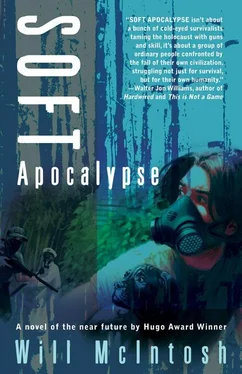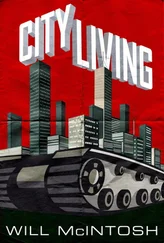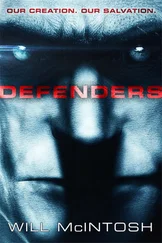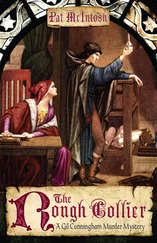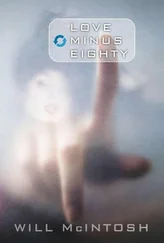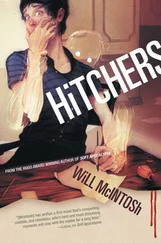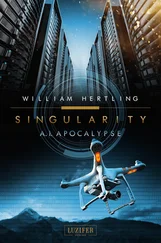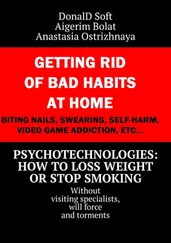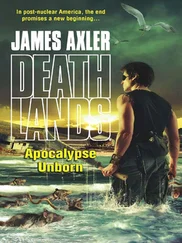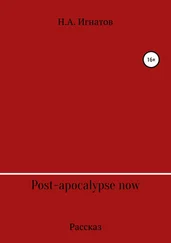Soon the first hints of sunrise were blooming behind me. I could make out Phoebe’s sneakers, the tangle of her hair.
But it hadn’t been more than an hour since sundown! I glanced back, saw an orange glow on the horizon.
Then I smelled smoke.
I slowed. “Hold on.”
Phoebe slowed, called the others to a halt. We stared at the orange glow filtering through the forest. Now that it was quiet, I could hear the distant roar of the flames.
“Does anyone know what to do?” Cortez asked. “I don’t know anything about fires.”
Silence.
“If we hole up in a house, the fire will burn it down,” Colin said. There were no spaces anywhere—the bamboo touched everything, and so would the flames.
“Can we outrun it?” Jeannie asked.
“I guess we have to,” Colin said.
We ran. Within minutes the air was hazy, and smelled like roasting chestnuts. My back felt vaguely warm.
“This isn’t any good,” I said, maybe not loud enough for anyone but me to hear.
“Wait,” Colin said. I bumped into Phoebe, who had stopped. Colin pointed at a steel dome rising out of the bamboo. A grain silo. “What about that? That won’t burn.”
“Come on.” Cortez broke for it.
The door was locked with a fat padlock. Cortez pulled the pistol and shot it; it burst apart. He pulled off the remnant and threw open the door and we all hurried in.
It was a round, empty space, maybe ten feet across. It was too dark to see the domed ceiling maybe thirty feet above us. Cortez pulled the door closed. It was dark, and stiflingly hot. Joel began to wail.
The silo wasn’t airtight by any means, so there would be smoke. I wondered how much. I knew that most people who died in fires died from the smoke, not the fire. “When it comes, stay on the ground with your mouth as close to the floor as possible,” I said.
We waited in silence for a few minutes, and nothing happened—no roaring outside, no smoke.
“Maybe the wind shifted and it missed us?” Colin suggested.
“Why don’t I check?” Cortez said. “Everybody move away from the door.” A bright crack of light formed, then a big square. The light flooding into the silo was tinged orange, and thick with smoke. Cortez slammed the door. “It’s coming. Everyone down.”
I got on my stomach, cradled my face in my arms and closed my eyes.
Twice in my life I had been certain I was going to die. The first had been when the Jumpy-Jumps pulled me into that alley, the second when I was caught trying to steal from the farmers and Ange had saved my life. Now, as I lay in a silo hoping to ride out a forest fire, I suspected that this might really be it.
I crawled on hands and knees over to Phoebe, put a hand on her wrist. She turned her hand palm up, took mine in hers.
There was a squealing, like air leaking from an inner tube. The smell of roasting chestnuts grew heavier.
“How long will it last?” someone asked. No one answered. I didn’t think it would be too long. Didn’t forest fires travel fast? Off on the other side of the silo, Joel was crying. Poor Joel, with his fresh little lungs.
The squealing grew deeper, or maybe a deeper sound drowned out the squealing. It became that roar that could never be mistaken for anything but fire.
Someone coughed. I tried to press my face into the crook of my elbow to create a little pocket of oxygen, but I could already feel a tickle in my lungs. I coughed.
The roar became deafening. I took a breath, felt my lungs fill with hot smoke. I coughed uncontrollably, nearly gagged. Joel screamed—a piercing cry of outrage that was followed by frantic coughing. I hadn’t noticed that it was getting hotter, but suddenly my clothes were so hot they felt like they were burning my skin. I wanted to pull them off, but that would involve exertion, and then I would have to breathe. I didn’t want to inhale again. I lingered on the outbreath, expelling the smoke, willing the fire to pass.
When I finally did inhale, it was agony. The smoke was hot; it singed my throat, made me cough so hard it was more a full-body spasm. I was burning up—the heat both outside me and in. I heard Phoebe’s coughs in my ear, clutched her hand like a lifeline.
Around us others were coughing and gagging in the darkness. I tried to inhale, but it felt as if my lungs had collapsed, like I was trying to inhale with something clamped over my mouth. The sounds around me receded. I was losing consciousness. I was suffocating. My legs drew up of their own accord, putting me in a fetal position. Fetal, as in fetus, but not a cat fetus, which I once ate. I was fairly sure I was dying, receding into a swirling blackness punctuated by swirls of even darker blackness that popped into my vision with each cough. Although I knew my arms were up near my head, I had the sensation that they had drifted up behind my head and were twisting and stretching. Far off, someone was screaming. It may have been Ange.
I felt a squeeze on my hand. I coughed. It felt like I’d been gone. I coughed again. It hurt like hell. My throat was raw, like someone had peeled all of the skin out of there.
Phoebe’s coughs returned, or I returned to where I could hear them, then I could hear the others coughing as well.
There was a blinding light. I lifted my head, saw Cortez curled up by the door, which was now ajar. Red light filtered in, along with heavy black smoke. Cortez closed the door.
I coughed, and this time the cough felt more productive, making me feel slightly better instead of worse, so I let my spasming chest go, let myself cough.
Joel began to scream.
I gave Phoebe’s hand a final squeeze and let go, then sat up, tried to rub the smoke out of my eyes with fists that were just as smoky. I crawled over to the door.
“I guess we should wait until the worst of the smoke has cleared,” Cortez said.
We stepped out into a different, completely alien place. Instead of bamboo leaves right in front of your face no matter where you turned, the landscape was a vast black desert covered with charred spikes (the remnants of the bamboo) and black, naked trees. In the mix of starlight and the red glow radiating from the horizon, it was a chilling sight.
We stared off at the burned land. The assholes pursuing us had probably assumed we were dead, and had gone home, so there was probably no need to hurry. We had no supplies, no food or water, no tents, no clean clothes.
“Which way?” I asked. We’d come from the north, so that was out. The fire was moving south, so we’d only hit more devastation that way, so it was east or west. I crossed my arms, pointed toward the east and west simultaneously. “That way is a very nice way.”
It was a lame joke, but I got some laughs.
“Of course people do go both ways,” Colin said absently.
“Hey, Scarecrow, how about a little fire?” Phoebe said, doing a decent Wicked Witch of the West impression that got people giggling.
Cortez began to sing, “Ding-Dong! The Witch Is Dead,” and a few of us joined in. If we’d had more energy, maybe we would have tried to do that special skip that Dorothy and her companions used when traipsing down the yellow brick road, but our giddy relief didn’t extend that far. We left it at “Ding Dong! The Witch Is Dead,” then grew serious again. We weren’t nearly out of the woods yet.
“I guess the first priority is finding abandoned houses that are not burned, to salvage some clothes and whatever else we can use,”
I said.
“East or west?” Cortez asked.
“Colin and I vote west,” Jeannie said. She was bouncing Joel, who’d quieted down. His little head bobbed languidly as if nothing had happened.
But what was west? Athens, then Atlanta. Atlanta would likely be a bigger mess than Savannah, and we weren’t welcome in Athens.
Читать дальше
